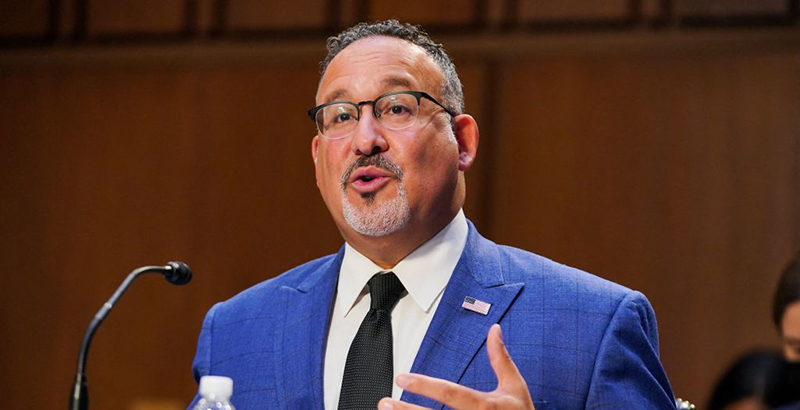States Look to Ed Department for Guidance on Restarting Testing and Accountability After Two Years of Pandemic-Related Interruptions

Get stories like this delivered straight to your inbox. Sign up for The 74 Newsletter
The 2021-22 school year is nearly half over and some state officials say they’re still waiting for guidance from the U.S. Department of Education on how to restart the process of identifying schools most in need of assistance and setting expectations for how they should improve.
Though assessment issues came up last week in a conversation with state superintendents at a Council of Chief State School Officers policy forum, U.S. Education Secretary Miguel Cardona didn’t address a burning question for many state officials — how to meet the accountability requirements under the Every Student Succeeds Act after two years of testing disruptions.
“In some cases we simply don’t have the data to calculate accountability scores using normal business rules,” said Georgia Department of Education spokeswoman Meghan Frick. “That will necessitate some adjustments.”
State assessments were cancelled in 2020. In 2021, the U.S. Department of Education waived the requirement that states test 95 percent of students. And in both years, states were exempted from publicly sharing which schools did not meet standards and how officials planned to turn them around. Some leaders and experts seized on the pause in testing and accountability as an opportunity to rethink the role of standardized assessments in determining school quality. But education advocates and think tanks argue that the disruption in learning due to the pandemic makes it even more important to identify and get help to schools that need it most.
“There’s still no clarity from the feds about how they expect testing to proceed — or not — in spring 2022,” said Dale Chu, a senior visiting fellow with the Thomas B. Fordham Institute, a conservative education think tank. “It’s worrisome.”
The department did not respond to requests for a comment.
Experts said they don’t expect the department to issue any more testing-related waivers. Dan Farley, the Oregon Department of Education’s director of assessment, said he’s “awaiting guidance regarding accountability that will largely maintain prior expectations” in place before the pandemic.
Under the law, states are required to test students in reading, math and science. They must share the results on state report cards and identify the schools that score in the bottom 5 percent in the state as well as those in which a demographic group, such as Black students or English learners, consistently performs poorly. States then have to get those schools headed in the right direction, using strategies that can range from hiring consultants to replacing teachers and administrators.
But even if states resume testing 95 percent of students this year, as federal law requires, some officials still wonder how states will measure school improvement since the 2018-19 school year. In some states last year, large proportions of parents opted their children out of testing or students didn’t take tests because they were still in remote learning.
In South Carolina, test participation during the 2020-21 school year fell to 87 percent, compared to 99 percent before the pandemic, according to Ryan Brown, spokesman for the South Carolina Department of Education.
The missing data, he said, impacts the scores schools receive for showing improvement over multiple years. And if high school students didn’t take the ACT, SAT or the state’s career readiness assessment, it will be hard to calculate how well schools have prepared students for college or the workforce.
“We would be looking for guidance and flexibility from the U.S. Department of Education in this area,” he said.
But leaders in states that retained high test participation feel more confident about resuming accountability.
North Dakota had a 97 percent testing participation rate last year. The state education department even sent letters to the top-performing schools and to those scoring at the bottom to let them know where they would fall on the state’s accountability system had it been in effect, Superintendent Kirsten Baesler said in an interview after last week’s event.
Baesler said she felt it would have been irresponsible not to share that information with local leaders. She didn’t want schools to have a “false sense of accomplishment,” she said.
“I think people assumed that because we were in person most of this school year, that we were fine,” she said. “There’s still chaos in our students’ lives and in our teachers’ lives.”
She’s also among those state leaders who want to see a new approach to assessment. At the state superintendents’ gathering last week, she asked Cardona how states can “measure what we say we really value.”
“We’re committed to assessing the whole student,” she said, “but we still have an assessment system that is measuring basic foundational knowledge.” Get stories like these delivered straight to your inbox. Sign up for The 74 Newsletter

;)
